[English] 日本語
 Yorodumi
Yorodumi- EMDB-26060: Cryo-em structure of human prothrombin:prothrombinase at 4.1 Angs... -
+ Open data
Open data
- Basic information
Basic information
| Entry |  | |||||||||
|---|---|---|---|---|---|---|---|---|---|---|
| Title | Cryo-em structure of human prothrombin:prothrombinase at 4.1 Angstrom resolution | |||||||||
 Map data Map data | prothrombin:prothrombinase | |||||||||
 Sample Sample |
| |||||||||
 Keywords Keywords | prothrombin prothrombinase / BLOOD CLOTTING | |||||||||
| Function / homology |  Function and homology information Function and homology informationresponse to vitamin K / coagulation factor Xa / platelet alpha granule / Cargo concentration in the ER / COPII-coated ER to Golgi transport vesicle / Defective factor IX causes thrombophilia / Defective cofactor function of FVIIIa variant / Defective F9 variant does not activate FX / COPII-mediated vesicle transport / Extrinsic Pathway of Fibrin Clot Formation ...response to vitamin K / coagulation factor Xa / platelet alpha granule / Cargo concentration in the ER / COPII-coated ER to Golgi transport vesicle / Defective factor IX causes thrombophilia / Defective cofactor function of FVIIIa variant / Defective F9 variant does not activate FX / COPII-mediated vesicle transport / Extrinsic Pathway of Fibrin Clot Formation / blood circulation / : / thrombospondin receptor activity / Defective factor XII causes hereditary angioedema / thrombin / thrombin-activated receptor signaling pathway / negative regulation of astrocyte differentiation / regulation of blood coagulation / neutrophil-mediated killing of gram-negative bacterium / positive regulation of phospholipase C-activating G protein-coupled receptor signaling pathway / Defective F8 cleavage by thrombin / Platelet Aggregation (Plug Formation) / ligand-gated ion channel signaling pathway / positive regulation of collagen biosynthetic process / blood coagulation, fibrin clot formation / negative regulation of platelet activation / negative regulation of blood coagulation / negative regulation of fibrinolysis / positive regulation of blood coagulation / positive regulation of TOR signaling / Transport of gamma-carboxylated protein precursors from the endoplasmic reticulum to the Golgi apparatus / regulation of cytosolic calcium ion concentration / Gamma-carboxylation of protein precursors / Common Pathway of Fibrin Clot Formation / Removal of aminoterminal propeptides from gamma-carboxylated proteins / fibrinolysis / Intrinsic Pathway of Fibrin Clot Formation / negative regulation of proteolysis / endoplasmic reticulum-Golgi intermediate compartment membrane / negative regulation of cytokine production involved in inflammatory response / platelet alpha granule lumen / Regulation of Complement cascade / Peptide ligand-binding receptors / positive regulation of release of sequestered calcium ion into cytosol / acute-phase response / Cell surface interactions at the vascular wall / positive regulation of receptor signaling pathway via JAK-STAT / Post-translational protein phosphorylation / growth factor activity / lipopolysaccharide binding / positive regulation of insulin secretion / platelet activation / phospholipid binding / positive regulation of protein localization to nucleus / response to wounding / Golgi lumen / Regulation of Insulin-like Growth Factor (IGF) transport and uptake by Insulin-like Growth Factor Binding Proteins (IGFBPs) / positive regulation of reactive oxygen species metabolic process / blood coagulation / Platelet degranulation / antimicrobial humoral immune response mediated by antimicrobial peptide / regulation of cell shape / heparin binding / extracellular vesicle / Thrombin signalling through proteinase activated receptors (PARs) / positive regulation of cell growth / blood microparticle / G alpha (q) signalling events / cell surface receptor signaling pathway / positive regulation of phosphatidylinositol 3-kinase/protein kinase B signal transduction / positive regulation of cell migration / endoplasmic reticulum lumen / receptor ligand activity / signaling receptor binding / copper ion binding / serine-type endopeptidase activity / external side of plasma membrane / positive regulation of cell population proliferation / calcium ion binding / proteolysis / extracellular space / extracellular exosome / extracellular region / membrane / plasma membrane Similarity search - Function | |||||||||
| Biological species |  Homo sapiens (human) Homo sapiens (human) | |||||||||
| Method | single particle reconstruction / cryo EM / Resolution: 4.1 Å | |||||||||
 Authors Authors | Di Cera E / Ruben EA | |||||||||
| Funding support |  United States, 1 items United States, 1 items
| |||||||||
 Citation Citation |  Journal: Blood / Year: 2022 Journal: Blood / Year: 2022Title: Cryo-EM structure of the prothrombin-prothrombinase complex. Authors: Eliza A Ruben / Brock Summers / Michael J Rau / James A J Fitzpatrick / Enrico Di Cera /  Abstract: The intrinsic and extrinsic pathways of the coagulation cascade converge to a common step where the prothrombinase complex, comprising the enzyme factor Xa (fXa), the cofactor fVa, Ca2+ and ...The intrinsic and extrinsic pathways of the coagulation cascade converge to a common step where the prothrombinase complex, comprising the enzyme factor Xa (fXa), the cofactor fVa, Ca2+ and phospholipids, activates the zymogen prothrombin to the protease thrombin. The reaction entails cleavage at 2 sites, R271 and R320, generating the intermediates prethrombin 2 and meizothrombin, respectively. The molecular basis of these interactions that are central to hemostasis remains elusive. We solved 2 cryogenic electron microscopy (cryo-EM) structures of the fVa-fXa complex, 1 free on nanodiscs at 5.3-Å resolution and the other bound to prothrombin at near atomic 4.1-Å resolution. In the prothrombin-fVa-fXa complex, the Gla domains of fXa and prothrombin align on a plane with the C1 and C2 domains of fVa for interaction with membranes. Prothrombin and fXa emerge from this plane in curved conformations that bring their protease domains in contact with each other against the A2 domain of fVa. The 672ESTVMATRKMHDRLEPEDEE691 segment of the A2 domain closes on the protease domain of fXa like a lid to fix orientation of the active site. The 696YDYQNRL702 segment binds to prothrombin and establishes the pathway of activation by sequestering R271 against D697 and directing R320 toward the active site of fXa. The cryo-EM structure provides a molecular view of prothrombin activation along the meizothrombin pathway and suggests a mechanism for cleavage at the alternative R271 site. The findings advance our basic knowledge of a key step of coagulation and bear broad relevance to other interactions in the blood. | |||||||||
| History |
|
- Structure visualization
Structure visualization
| Supplemental images |
|---|
- Downloads & links
Downloads & links
-EMDB archive
| Map data |  emd_26060.map.gz emd_26060.map.gz | 823.3 MB |  EMDB map data format EMDB map data format | |
|---|---|---|---|---|
| Header (meta data) |  emd-26060-v30.xml emd-26060-v30.xml emd-26060.xml emd-26060.xml | 20.6 KB 20.6 KB | Display Display |  EMDB header EMDB header |
| Images |  emd_26060.png emd_26060.png | 36.3 KB | ||
| Masks |  emd_26060_msk_1.map emd_26060_msk_1.map | 874.4 MB |  Mask map Mask map | |
| Filedesc metadata |  emd-26060.cif.gz emd-26060.cif.gz | 6.9 KB | ||
| Others |  emd_26060_half_map_1.map.gz emd_26060_half_map_1.map.gz emd_26060_half_map_2.map.gz emd_26060_half_map_2.map.gz | 811.8 MB 811.8 MB | ||
| Archive directory |  http://ftp.pdbj.org/pub/emdb/structures/EMD-26060 http://ftp.pdbj.org/pub/emdb/structures/EMD-26060 ftp://ftp.pdbj.org/pub/emdb/structures/EMD-26060 ftp://ftp.pdbj.org/pub/emdb/structures/EMD-26060 | HTTPS FTP |
-Related structure data
| Related structure data |  7tppMC M: atomic model generated by this map C: citing same article ( |
|---|---|
| Similar structure data | Similarity search - Function & homology  F&H Search F&H Search |
- Links
Links
| EMDB pages |  EMDB (EBI/PDBe) / EMDB (EBI/PDBe) /  EMDataResource EMDataResource |
|---|---|
| Related items in Molecule of the Month |
- Map
Map
| File |  Download / File: emd_26060.map.gz / Format: CCP4 / Size: 874.4 MB / Type: IMAGE STORED AS FLOATING POINT NUMBER (4 BYTES) Download / File: emd_26060.map.gz / Format: CCP4 / Size: 874.4 MB / Type: IMAGE STORED AS FLOATING POINT NUMBER (4 BYTES) | ||||||||||||||||||||||||||||||||||||
|---|---|---|---|---|---|---|---|---|---|---|---|---|---|---|---|---|---|---|---|---|---|---|---|---|---|---|---|---|---|---|---|---|---|---|---|---|---|
| Annotation | prothrombin:prothrombinase | ||||||||||||||||||||||||||||||||||||
| Projections & slices | Image control
Images are generated by Spider. | ||||||||||||||||||||||||||||||||||||
| Voxel size | X=Y=Z: 0.413 Å | ||||||||||||||||||||||||||||||||||||
| Density |
| ||||||||||||||||||||||||||||||||||||
| Symmetry | Space group: 1 | ||||||||||||||||||||||||||||||||||||
| Details | EMDB XML:
|
-Supplemental data
-Mask #1
| File |  emd_26060_msk_1.map emd_26060_msk_1.map | ||||||||||||
|---|---|---|---|---|---|---|---|---|---|---|---|---|---|
| Projections & Slices |
| ||||||||||||
| Density Histograms |
-Half map: prothrombin:prothrombinase
| File | emd_26060_half_map_1.map | ||||||||||||
|---|---|---|---|---|---|---|---|---|---|---|---|---|---|
| Annotation | prothrombin:prothrombinase | ||||||||||||
| Projections & Slices |
| ||||||||||||
| Density Histograms |
-Half map: prothrombin:prothrombinase
| File | emd_26060_half_map_2.map | ||||||||||||
|---|---|---|---|---|---|---|---|---|---|---|---|---|---|
| Annotation | prothrombin:prothrombinase | ||||||||||||
| Projections & Slices |
| ||||||||||||
| Density Histograms |
- Sample components
Sample components
-Entire : prothrombin prothrombinase
| Entire | Name: prothrombin prothrombinase |
|---|---|
| Components |
|
-Supramolecule #1: prothrombin prothrombinase
| Supramolecule | Name: prothrombin prothrombinase / type: complex / ID: 1 / Parent: 0 / Macromolecule list: all |
|---|
-Supramolecule #2: Prothrombin (E.C.3.4.21.5), Factor X light chain, Activated facto...
| Supramolecule | Name: Prothrombin (E.C.3.4.21.5), Factor X light chain, Activated factor Xa heavy chain type: complex / ID: 2 / Parent: 1 / Macromolecule list: #1-#2, #5 |
|---|---|
| Source (natural) | Organism:  Homo sapiens (human) Homo sapiens (human) |
-Supramolecule #3: Coagulation factor Va
| Supramolecule | Name: Coagulation factor Va / type: complex / ID: 3 / Parent: 1 / Macromolecule list: #3-#4 |
|---|---|
| Source (natural) | Organism:  Homo sapiens (human) Homo sapiens (human) |
-Macromolecule #1: Prothrombin
| Macromolecule | Name: Prothrombin / type: protein_or_peptide / ID: 1 / Number of copies: 1 / Enantiomer: LEVO / EC number: thrombin |
|---|---|
| Source (natural) | Organism:  Homo sapiens (human) Homo sapiens (human) |
| Molecular weight | Theoretical: 65.370113 KDa |
| Recombinant expression | Organism:  Mesocricetus auratus (golden hamster) Mesocricetus auratus (golden hamster) |
| Sequence | String: ANTFLEEVRK GNLERECVEE TCSYEEAFEA LESSTATDVF WAKYTACETA RTPRDKLAAC LEGNCAEGLG TNYRGHVNIT RSGIECQLW RSRYPHKPEI NSTTHPGADL QENFCRNPDS STTGPWCYTT DPTVRRQECS IPVCGQDQVT VAMTPRSEGS S VNLSPPLE ...String: ANTFLEEVRK GNLERECVEE TCSYEEAFEA LESSTATDVF WAKYTACETA RTPRDKLAAC LEGNCAEGLG TNYRGHVNIT RSGIECQLW RSRYPHKPEI NSTTHPGADL QENFCRNPDS STTGPWCYTT DPTVRRQECS IPVCGQDQVT VAMTPRSEGS S VNLSPPLE QCVPDRGQQY QGRLAVTTHG LPCLAWASAQ AKALSKHQDF NSAVQLVENF CRNPDGDEEG VWCYVAGKPG DF GYCDLNY CEEAVEEETG DGLDEDSDRA IEGRTATSEY QTFFNPRTFG SGEADCGLRP LFEKKSLEDK TERELLESYI DGR IVEGSD AEIGMSPWQV MLFRKSPQEL LCGASLISDR WVLTAAHCLL YPPWDKNFTE NDLLVRIGKH SRTRYERNIE KISM LEKIY IHPRYNWREN LDRDIALMKL KKPVAFSDYI HPVCLPDRET AASLLQAGYK GRVTGWGNLK ETWTANVGKG QPSVL QVVN LPIVERPVCK DSTRIRITDN MFCAGYKPDE GKRGDACEGD AGGPFVMKSP FNNRWYQMGI VSWGEGCDRD GKYGFY THV FRLKKWIQKV IDQFGE UniProtKB: Prothrombin |
-Macromolecule #2: Factor X light chain
| Macromolecule | Name: Factor X light chain / type: protein_or_peptide / ID: 2 / Number of copies: 1 / Enantiomer: LEVO |
|---|---|
| Source (natural) | Organism:  Homo sapiens (human) Homo sapiens (human) |
| Molecular weight | Theoretical: 15.743385 KDa |
| Recombinant expression | Organism:  Mesocricetus auratus (golden hamster) Mesocricetus auratus (golden hamster) |
| Sequence | String: ANSFLEEMKK GHLERECMEE TCSYEEAREV FEDSDKTNEF WNKYKDGDQC ETSPCQNQGK CKDGLGEYTC TCLEGFEGKN CELFTRKLC SLDNGDCDQF CHEEQNSVVC SCARGYTLAD NGKACIPTGP YPCGKQTLER UniProtKB: Coagulation factor X |
-Macromolecule #3: Coagulation factor Va
| Macromolecule | Name: Coagulation factor Va / type: protein_or_peptide / ID: 3 / Number of copies: 1 / Enantiomer: LEVO |
|---|---|
| Source (natural) | Organism:  Homo sapiens (human) Homo sapiens (human) |
| Molecular weight | Theoretical: 81.274391 KDa |
| Sequence | String: AQLRQFYVAA QGISWSYRPE PTNSSLNLSV TSFKKIVYRE YEPYFKKEKP QSTISGLLGP TLYAEVGDII KVHFKNKADK PLSIHPQGI RYSKLSEGAS YLDHTFPAEK MDDAVAPGRE YTYEWSISED SGPTHDDPPC LTHIYYSHEN LIEDFNSGLI G PLLICKKG ...String: AQLRQFYVAA QGISWSYRPE PTNSSLNLSV TSFKKIVYRE YEPYFKKEKP QSTISGLLGP TLYAEVGDII KVHFKNKADK PLSIHPQGI RYSKLSEGAS YLDHTFPAEK MDDAVAPGRE YTYEWSISED SGPTHDDPPC LTHIYYSHEN LIEDFNSGLI G PLLICKKG TLTEGGTQKT FDKQIVLLFA VFDESKSWSQ SSSLMYTVNG YVNGTMPDIT VCAHDHISWH LLGMSSGPEL FS IHFNGQV LEQNHHKVSA ITLVSATSTT ANMTVGPEGK WIISSLTPKH LQAGMQAYID IKNCPKKTRN LKKITREQRR HMK RWEYFI AAEEVIWDYA PVIPANMDKK YRSQHLDNFS NQIGKHYKKV MYTQYEDESF TKHTVNPNMK EDGILGPIIR AQVR DTLKI VFKNMASRPY SIYPHGVTFS PYEDEVNSSF TSGRNNTMIR AVQPGETYTY KWNILEFDEP TENDAQCLTR PYYSD VDIM RDIASGLIGL LLICKSRSLD RRGIQRAADI EQQAVFAVFD ENKSWYLEDN INKFCENPDE VKRDDPKFYE SNIMST ING YVPESITTLG FCFDDTVQWH FCSVGTQNEI LTIHFTGHSF IYGKRHEDTL TLFPMRGESV TVTMDNVGTW MLTSMNS SP RSKKLRLKFR DVKCIPDDDE DSYEIFEPPE STVMATRKMH DRLEPEDEES DADYDYQNRL AAALGIR UniProtKB: Coagulation factor V |
-Macromolecule #4: Coagulation factor Va
| Macromolecule | Name: Coagulation factor Va / type: protein_or_peptide / ID: 4 / Number of copies: 1 / Enantiomer: LEVO |
|---|---|
| Source (natural) | Organism:  Homo sapiens (human) Homo sapiens (human) |
| Molecular weight | Theoretical: 75.283008 KDa |
| Sequence | String: SNNGNRRNYY IAAEEISWDY SEFVQRETDI EDSDDIPEDT TYKKVVFRKY LDSTFTKRDP RGEYEEHLGI LGPIIRAEVD DVIQVRFKN LASRPYSLHA HGLSYEKSSE GKTYEDDSPE WFKEDNAVQP NSSYTYVWHA TERSGPESPG SACRAWAYYS A VNPEKDIH ...String: SNNGNRRNYY IAAEEISWDY SEFVQRETDI EDSDDIPEDT TYKKVVFRKY LDSTFTKRDP RGEYEEHLGI LGPIIRAEVD DVIQVRFKN LASRPYSLHA HGLSYEKSSE GKTYEDDSPE WFKEDNAVQP NSSYTYVWHA TERSGPESPG SACRAWAYYS A VNPEKDIH SGLIGPLLIC QKGILHKDSN MPMDMREFVL LFMTFDEKKS WYYEKKSRSS WRLTSSEMKK SHEFHAINGM IY SLPGLKM YEQEWVRLHL LNIGGSQDIH VVHFHGQTLL ENGNKQHQLG VWPLLPGSFK TLEMKASKPG WWLLNTEVGE NQR AGMQTP FLIMDRDCRM PMGLSTGIIS DSQIKASEFL GYWEPRLARL NNGGSYNAWS VEKLAAEFAS KPWIQVDMQK EVII TGIQT QGAKHYLKSC YTTEFYVAYS SNQINWQIFK GNSTRNVMYF NGNSDASTIK ENQFDPPIVA RYIRISPTRA YNRPT LRLE LQGCEVNGCS TPLGMENGKI ENKQITASSF KKSWWGDYWE PFRARLNAQG RVNAWQAKAN NNKQWLEIDL LKIKKI TAI ITQGCKSLSS EMYVKSYTIH YSEQGVEWKP YRLKSSMVDK IFEGNTNTKG HVKNFFNPPI ISRFIRVIPK TWNQSIA LR LELFGCDIY UniProtKB: Coagulation factor V |
-Macromolecule #5: Activated factor Xa heavy chain
| Macromolecule | Name: Activated factor Xa heavy chain / type: protein_or_peptide / ID: 5 / Number of copies: 1 / Enantiomer: LEVO |
|---|---|
| Source (natural) | Organism:  Homo sapiens (human) Homo sapiens (human) |
| Molecular weight | Theoretical: 28.534596 KDa |
| Recombinant expression | Organism:  Mesocricetus auratus (golden hamster) Mesocricetus auratus (golden hamster) |
| Sequence | String: IVGGQECKDG ECPWQALLIN EENEGFCGGT ILSEFYILTA AHCLYQAKRF KVRVGDRNTE QEEGGEAVHE VEVVIKHNRF TKETYDFDI AVLRLKTPIT FRMNVAPACL PERDWAESTL MTQKTGIVSG FGRTHEKGRQ STRLKMLEVP YVDRNSCKLS S SFIITQNM ...String: IVGGQECKDG ECPWQALLIN EENEGFCGGT ILSEFYILTA AHCLYQAKRF KVRVGDRNTE QEEGGEAVHE VEVVIKHNRF TKETYDFDI AVLRLKTPIT FRMNVAPACL PERDWAESTL MTQKTGIVSG FGRTHEKGRQ STRLKMLEVP YVDRNSCKLS S SFIITQNM FCAGYDTKQE DACQGDAGGP HVTRFKDTYF VTGIVSWGEG CARKGKYGIY TKVTAFLKWI DRSMKTRGLP KA KSHAPEV ITSSPLK UniProtKB: Coagulation factor X |
-Experimental details
-Structure determination
| Method | cryo EM |
|---|---|
 Processing Processing | single particle reconstruction |
| Aggregation state | particle |
- Sample preparation
Sample preparation
| Buffer | pH: 7.4 / Details: 20mM Hepes, 150mM NaCl, 5mM CaCl2 |
|---|---|
| Vitrification | Cryogen name: ETHANE |
- Electron microscopy
Electron microscopy
| Microscope | FEI TITAN KRIOS |
|---|---|
| Image recording | Film or detector model: GATAN K3 (6k x 4k) / Average electron dose: 50.0 e/Å2 |
| Electron beam | Acceleration voltage: 300 kV / Electron source:  FIELD EMISSION GUN FIELD EMISSION GUN |
| Electron optics | Illumination mode: FLOOD BEAM / Imaging mode: BRIGHT FIELD / Nominal defocus max: 3.0 µm / Nominal defocus min: 1.0 µm |
| Experimental equipment |  Model: Titan Krios / Image courtesy: FEI Company |
- Image processing
Image processing
| Startup model | Type of model: PDB ENTRY PDB model - PDB ID: Details: 7kve |
|---|---|
| Final reconstruction | Resolution.type: BY AUTHOR / Resolution: 4.1 Å / Resolution method: FSC 0.143 CUT-OFF / Number images used: 330317 |
| Initial angle assignment | Type: ANGULAR RECONSTITUTION |
| Final angle assignment | Type: ANGULAR RECONSTITUTION |
 Movie
Movie Controller
Controller









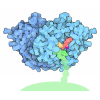
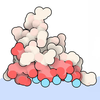


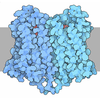

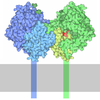

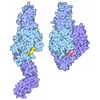

 Z (Sec.)
Z (Sec.) Y (Row.)
Y (Row.) X (Col.)
X (Col.)













































